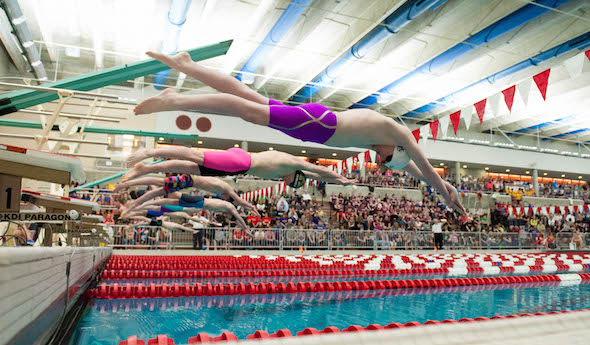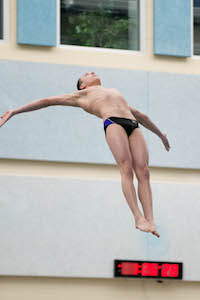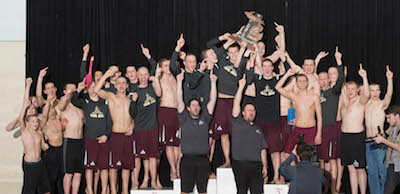
Dexter Builds Lead, Carries it to D2 Title
By
Paul Costanzo
Special for MHSAA.com
March 12, 2016
UNIVERSITY CENTER – Mike McHugh was floating on his back in the Saginaw Valley State University pool Saturday afternoon, water soaking his clothes and a smile covering his face.
The Dexter coach, who had spent the previous four hours wearing out his shoes walking the pool’s deck, could now relax as his Dreadnaughts had won the Lower Peninsula Division 2 boys swimming and diving championship.
“It was the best swim I’ve ever had,” said McHugh, who also led Dexter to an MHSAA title in 2012 and a runner-up finish in 2014. “These guys work. I’m thankful for all the work they put in. I’m thankful for all the support I get from home. It’s a relief. It’s been a lot of pressure being ranked No. 1 all year, so being able to finish it off feels really good.”
Behind championship swims in the 200-yard freestyle and 100 backstroke by senior Rob Zofchak, and 13 total top-eight finishes, Dexter finished with a meet-best 284 points. Warren DeLaSalle was second with 266, two-time reigning champion Birmingham Seaholm was third with 211 and Battle Creek Lakeview was fourth with 205.
 “We knew coming in we had to build up a lead,” McHugh said. “DeLaSalle’s really good in the back and breast(stroke). We’re really good in the 200 (freestyle), 500 and (individual medley). We knew we had to go big, and having seven top-eight swims in those three events was huge. I had three seniors make top eight in the 200 free (Zofchak, Matt Bergdolt who was second, and David Merz who was eighth). That’s the leadership we’ve got. Three senior leaders, two of them captains, just doing everything they can.”
“We knew coming in we had to build up a lead,” McHugh said. “DeLaSalle’s really good in the back and breast(stroke). We’re really good in the 200 (freestyle), 500 and (individual medley). We knew we had to go big, and having seven top-eight swims in those three events was huge. I had three seniors make top eight in the 200 free (Zofchak, Matt Bergdolt who was second, and David Merz who was eighth). That’s the leadership we’ve got. Three senior leaders, two of them captains, just doing everything they can.”
Dexter still had work to do in the final race of the meet, although it wasn’t much. If DeLaSalle didn’t win the 400 freestyle relay, all the Dreadnaughts needed to win the meet were to not get disqualified in the race. They finished second, one spot ahead of the Pilots. Fittingly, it was Zofchak who swam the final leg of the relay.
“It’s something special,” Zofchak said. “You feel great. Even though you’re swimming hard, you’re going as hard as you can and you’re really tired, you still feel great. Like, ‘Wow. There’s not much I can do right now to mess this up.’”
The anchor leg capped off a great day in the pool for Zofchak, who won the 200 freestyle in 1 minute, 38.23 seconds, and the 100 backstroke in 49.26 – breaking his own meet record.
“I swam pretty well,” he said. “There’s definitely things I can improve on, and I’ll keep working on those, but in general I’m pretty proud of my swims.”
Zofchak was one of three swimmers to take home two individual titles on the day, joining Grosse Pointe South’s Jacob Montague and Midland Dow’s Nehemiah Mork.
Montague won the 200 individual medley and 100 breaststroke with LP Division 2 meet records of 1:47.4 and 53.93, respectively. It was the second straight year he’d won MHSAA titles in those events.
As Montague swam to commanding leads in both races, spectators watched in awe, some even counting the number of times he came out of the water in the breaststroke and marveling at how infrequently he did so.
“My freshman year, I only qualified for one event at the state meet and I didn’t even make it to finals,” Montague said. “I never thought that I’d be able to compete at a level like this. These past couple years I’ve given everything I can in the pool, every practice, every day. I just give 100 percent, just trying to get better. When everything pays off in the end, it’s just a great feeling.”
Mork was also a repeat champion in both of his events. He won the 50 freestyle in 20.83 seconds, one hundredth of a second ahead of Seaholm’s Liam Little. Mork won the 100 in 45.43 seconds.
 “I could kind of see that (Little) was close to me – I had no idea it was a hundredth of a second close,” Mork said. “I saw him gliding a little bit; that’s when I knew I had to get a good finish, and I touched him out. But then everybody started cheering and I thought, ‘Aw shoot, I lost.’
“I could kind of see that (Little) was close to me – I had no idea it was a hundredth of a second close,” Mork said. “I saw him gliding a little bit; that’s when I knew I had to get a good finish, and I touched him out. But then everybody started cheering and I thought, ‘Aw shoot, I lost.’
“Then I looked up and it was a hundredth of a second and I still won, so I’ll take it.”
Also repeating as champion was Seaholm diver Sebastian Fay, who won with 479.4 points. He had a commanding lead coming into the final dives, but didn’t rest on his laurels.
“It puts more (pressure) on me, because diving is a sport where anything can happen,” Fay said. “I try not to let the lead get in my head because then I’ll just relax. With that dive especially, that last dive, I need to go after it, and if I relax I’m going to screw it up.
“So honestly, I felt a little more nervous at the end. My heart was pounding pretty hard, so I had to calm down.”
Seaholm won the 200 and 400 freestyle relays, while DeLaSalle won the 200 medley relay. DeLaSalle’s P.J. Desmet won the 100 butterfly in 51.21, while Rochester Adams’ Graham Miotke won the 500 freestyle in 4:35.64.
PHOTOS: (Top) Swimmers launch during Saturday’s LP Division 2 Finals at Saginaw Valley State University. (Middle) A diver arches during competition. (Below) Dexter poses with its championship trophy. (Click to see more at HighSchoolSportsScene.com.)

- Boys Swim & Dive
- Wrestling
- Girls Swim & Dive
- Competitive Cheer
- Girls Bowling
- Girls Skiing
- Boys Skiing
- Girls Basketball
- Boys Basketball
- Boys Bowling
- Gymnastics
- Ice Hockey
- MHSAA News
MHSAA Winter Sports Start with Extended Basketball Schedules, New Wrestling Weights
By
Geoff Kimmerly
MHSAA.com senior editor
December 13, 2022
The addition of two games to basketball regular-season schedules and a new series of wrestling weight classes are likely the most noticeable Winter 2022-23 changes as an estimated 65,000 athletes statewide take part in 13 sports for which the Michigan High School Athletic Association sponsors postseason tournaments.
Girls gymnastics and boys ice hockey teams were able to begin practice Oct. 31, with the rest of those sports beginning in November – including also girls and boys basketball, girls and boys bowling, girls competitive cheer, girls and boys skiing, Upper Peninsula girls and boys and Lower Peninsula boys swimming & diving, and girls and boys wrestling.
A variety of changes are in effect for winter sports this season, including a several that will be noteworthy and noticeable to teams and spectators alike.
Basketball remains the most-participated winter sport for MHSAA member schools with 33,000 athletes taking part last season, and for the first time, basketball teams may play up to 22 regular-season games. This increase from the previous 20-game schedule allows more games for teams at every high school level – varsity, junior varsity and freshman.
Another significant change has been made in wrestling, as the majority of boys wrestling weight classes have been adjusted for this season in anticipation of a national change coming in 2023-24. The updated boys weight classes are 106, 113, 120, 126, 132, 138, 144, 150, 157, 165, 175, 190, 215 and 285 pounds. Only 215 and 285 remain from the previous lineup. There is also one change to girls weight classes, with the 255 class replaced by 235 to also align with national high school standards.
A series of notable changes will affect how competition takes place at the MHSAA Tournament levels. In hockey, in addition to a new classification process that spread cooperative and single-school programs evenly throughout the three playoff divisions, the MHSAA Tournament will employ two changes. The Michigan Power Ratings (MPR) will be used to seed the entire Regional round, not just the top two teams, and prior to the start of Semifinals, a seeding committee will reseed the remaining four teams in each division with the top seed in each then facing the No. 4 seed, and the No. 2 seed facing No. 3.
Bowling also will see an MHSAA Tournament change, as the Team Regional format will mirror the long-standing Team Final with teams playing eight Baker games and two regular games at both levels. And as also applied during the fall girls season, there is a new qualification process for divers seeking to advance to Lower Peninsula Boys Swimming & Diving Finals. In each of the three divisions, each Regional will be guaranteed 10 qualifiers for the Finals, with six more “floating” qualifier entries to be distributed to the Regionals that have one of the previous year’s top six returning Finals divers in their fields. If a team changes division from the previous season, any floating top-six spots are added to the six already allowed in the school’s new division.
A gymnastics rules change provides an opportunity for additional scoring during the floor exercise. A dance passage requirement was added in place of the former dance series requirement to encourage creativity and a more artistic use of dance. The dance passage requires gymnasts to include two Group 1 elements – one a leap with legs in cross or side split position, the other a superior element.
In competitive cheer, the penalty for going over the time limit in each round was adjusted to one penalty point for every second over the time limit, not to exceed 15 points. The new time limit rule is more lenient than the past penalty, which subtracted points based on ranges of time over the limit.
The 2022-23 Winter campaign culminates with postseason tournaments, as the championship schedule begins with the Upper Peninsula Girls & Boys Swimming & Diving Finals on Feb. 18 and wraps up with the Boys Basketball Finals on March 25. Here is a complete list of winter tournament dates:
Boys Basketball
Districts – March 6, 8, 10
Regionals – March 13, 15
Quarterfinals – March 21
Semifinals – March 23-24
Finals – March 25
Girls Basketball
Districts – Feb. 27, March 1, 3
Regionals – March 7, 9
Quarterfinals – March 14
Semifinals – March 16-17
Finals – March 18
Bowling
Regionals – Feb. 24-25
Finals – March 3-4
Competitive Cheer
District – Feb. 17-18
Regionals – Feb. 25
Finals – March 2-3
Gymnastics
Regionals – March 4
Finals – March 10-11
Ice Hockey
Regionals – Feb. 20-March 1
Quarterfinals – March 4
Semifinals – March 9-10
Finals – March 11
Skiing
Regionals – Feb. 13-17
Finals – Feb. 27
Swimming & Diving
Upper Peninsula Girls/Boys Finals – Feb. 18
Lower Peninsula Boys Diving Regionals – March 2
Lower Peninsula Boys Finals – March 10-11
Wrestling – Team
Districts – Feb. 8-9
Regionals – Feb. 15
Finals – Feb. 24-25
Wrestling – Individual
Districts – Feb. 11
Regionals – Feb. 18
Finals – March 3-4
The MHSAA is a private, not-for-profit corporation of voluntary membership by more than 1,500 public and private senior high schools and junior high/middle schools which exists to develop common rules for athletic eligibility and competition. No government funds or tax dollars support the MHSAA, which was the first such association nationally to not accept membership dues or tournament entry fees from schools. Member schools which enforce these rules are permitted to participate in MHSAA tournaments, which attract more than 1.3 million spectators each year.

